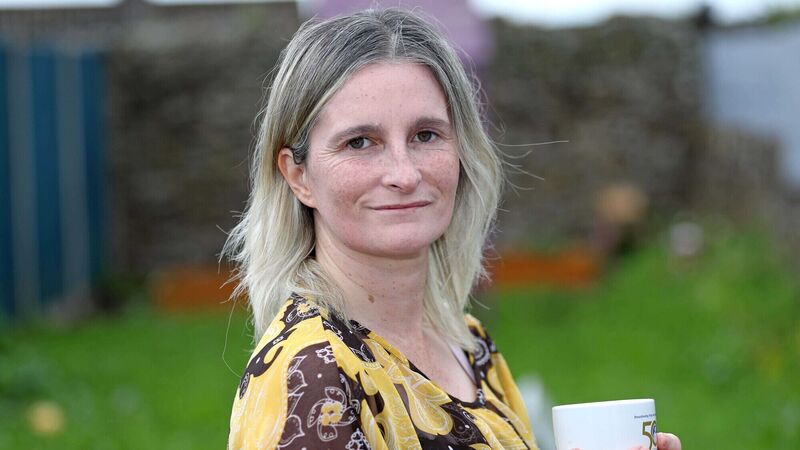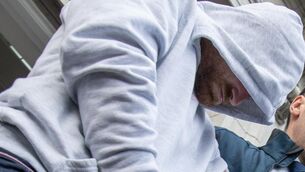'I didn't see any reason to stop': Lactation consultant says breastfeeding for longer is a positive

Maria O’Sullivan from Dillon’s Cross, a private lactation consultant, and one of Cork’s leading advocates for breastfeeding, expressed concern that some mothers are quitting nursing before they are ready as a result of pressures placed on them by society. Picture: Jim Coughlan.
A CORK woman who still nurses her six and a half years old daughter shared the benefits of extended breastfeeding in a bid to help mums struggling with societal pressures.
Maria O’Sullivan from Dillon’s Cross, a private lactation consultant, and one of Cork’s leading advocates for breastfeeding, expressed concern that some mothers are quitting nursing before they are ready as a result of pressures placed on them by society.
After breastfeeding her own three children beyond the age of four, Maria said she has seen the benefits first-hand. She told of how breastfeeding periods have become longer with each birth. It started with her oldest daughter Freyja — now 18 — who was breastfed until the age of four. Her son Xavier was breastfed until the age of six.
“We like to call it natural feeding as opposed to extended feeding,” she said.
“Each time it gets longer but Aurora is trying to beat the band. She is six-and-a-half years old but still has a feed now and again. I don’t see this as a negative thing. For us, it’s something positive. She is ready to let go and this is coinciding with the loss of her teeth. The clue is in the name, milk teeth.”
In anthropological terms. the natural weaning age is between two and four. However, Maria says: “It’s not like your milk suddenly loses its nutrients and antibodies after your child turns four.”
She opened up about the benefits this has had on her daughter Aurora’s health and wellbeing.
“In 2019, just before the Covid explosion, she was really sick. She had a fever for days and wasn’t eating anything. She was nursing around the clock. If she didn’t have that nutrition she probably would have ended up in hospital, but it was the breastmilk that helped her through.
“It wasn’t as if my milk had changed from when she was a baby to when she turned five. The health benefits were still exactly the same.”
She said that it will be Aurora’s decision to stop breastfeeding.
“Socially, Aurora is very aware. That social awareness came from herself. She wouldn’t ask to feed in public. She set those boundaries herself at about four. “
A mere 40% of babies across the globe are now exclusively breastfed to six months in line with WHO recommendations.
Ireland has the lowest breastfeeding rate in Europe with just 6% of babies being exclusively breastfed at six months. This is according to a Royal College of Physicians of Ireland study published last May.
Ms O’Sullivan helps women to establish breastfeeding in the early days.
The mum-of-three said the support she received was a significant help when breastfeeding her own children.
“I was in a circle of women breastfeeding beyond six months who were very comfortable with that. I had my first baby at 28 and was later tandem feeding my son and daughter because it seemed like an easy thing to do. I thought why would I stop when I have a healthy baby who wants to breastfeed. I didn’t see any reason to stop.”
She emphasised how lucky she was to have that support adding: “I see mothers every week struggling and it’s all about making sure they get the right support and knowledge about how they can protect their supply while working out any issues. Once the supply is protected in the early weeks then you have choices.”
The mum of three is calling for greater representation of breastfeeding both in educational settings and in the media.
“When you are not exposed to these ideas then they don’t seem normal.
“There are no statistics relating to how many mothers are breastfeeding at one, two, or three years old.
“That information isn’t collected and I haven’t experienced it. I moved in circles where this was normal, but if you are not exposed to this then it might not seem as natural. We don’t see mothers breastfeeding older children on television or in other forms of media which could potentially be a great tool for social awareness.”
Maria pointed out that many mothers feel pressured to shift to bottle-feeding early.
“There is a whole generation where people didn’t breastfeed. They are not sure how to support their daughter or daughter-in-law. Often it’s somebody else making that personal choice even though they want to do things differently.
“It’s all about bringing it back to that shared responsibility and realising that doing things differently isn’t a personal attack on a previous generation. It shouldn’t just be down to one woman to carry that load herself without any support.”
She said that kids should be educated from an early age about the different ways mothers feed their children.
“I think it’s important that children are exposed to the normality of breastfeeding,” she said.
“In pre-school and educational settings it’s important that children are exposed to the normality of breastfeeding images and not depict bottle feeding as the only way of feeding a baby.
“You didn’t use the word pregnancy before as if it was considered something dirty. Things are changing now. You see children playing at being pregnant or even breastfeeding their dolls and that should be encouraged.”
Maria said there has only been one incident where someone attempted to challenge her decision to breastfeed.
“I think it’s all about confidence. You can be discreet even though it’s more difficult when a child gets older and they are getting distracted.
“I never had a major issue because I had that confidence. The only small issue I ever had was a bit of a Fr Ted moment.
“An old lady stopped me on Patrick Street when I was breastfeeding my little girl when she was a year old. She told me that everyone was looking at me and I should ‘be ashamed of myself’.
“I can still recall my daughter looking up at me after it happened with these big innocent eyes.”
Maria advised anyone struggling with breastfeeding not to be afraid to access support.
- To find out more about supports available in Cork readers can log on to https://www.laleche.org.uk/ and https://breastfeedingcork.ie/










 App?
App?


